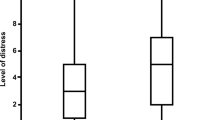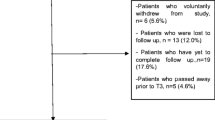Abstract
Our study explored the potential relationship between time estimation and issues that lead to distress in cancer patients prior to starting chemotherapy. Time estimation was assessed in 375 chemonaïve patients with solid tumors by evaluating each subject’s prospective estimation of how quickly one minute passed compared to the actual time. The median estimated value (40 s) was used to stratify the patients into the two categories of fast and slow time estimation. The National Comprehensive Cancer Network Distress Thermometer (DT) and Problem List (PL) were used at the beginning of treatment to evaluate levels of distress and patient concerns. A fast time estimation correlated significantly with gender and items reported in the emotional domain on the PL. Females exhibited significantly faster time estimation than males. Patients who reported fear, worry and loss of interest in usual activities estimated the one-minute interval significantly faster than patients who did not report such items. In the multivariate logistic regression model, patients who experienced fast time estimation had a higher risk of reporting items in the emotional domain. Time estimation is a novel potent indicator of emotional concerns on the PL. This test is an easily performed, time-saving, nonintrusive, ultrashort screening tool that is suitable even for patients who are not willing to reveal their emotional status via direct questionnaires.
Similar content being viewed by others
References
Baum, S. K., Boxley, R. L., & Sokolowski, M. (1984). Time perception and psychological well-being in the elderly. Psychiatric Quarterly, 56(1), 54–61.
Bellè, M., Muzzatti, B., Tomas, M., & Gherlinzoni, F. (2016). Psychological screening of onco-hematologic inpatients: Distress thermometer administration. Tumori Journal, 102(2), 178–183.
Brown, S. W., & Stubbs, D. A. (1988). The psychophysics of retrospective and prospective timing. Perception, 17(3), 297–310.
Bruss, F. T., & Rüschendorf, L. (2010). On the perception of time. Gerontology, 56(4), 361–370.
Conev, N. V., Donev, I. S., & Stoyanov, D. S. (2019). One-minute time interval estimation as a novel ultrashort tool for distress screening. Supportive Care in Cancer, 27(6), 2031–2037.
Essen, L. V., Larsson, G., Öberg, K., & Sjödén, P. O. (2002). ‘Satisfaction with care’: Associations with health-related quality of life and psychosocial function among Swedish patients with endocrine gastrointestinal tumours. European Journal of Cancer Care, 11(2), 91–99.
Fallowfield, L., Ratcliffe, D., Jenkins, V., & Saul, J. (2001). Psychiatric morbidity and its recognition by doctors in patients with cancer. British Journal of Cancer, 84(8), 1011–1015.
Fisch, M. (2004). Treatment of depression in cancer. JNCI Monographs, 2004(32), 105–111.
Foley, H., & Matlin, M. (2015). Sensation and perception. Psychology press.
Fraisse, P. (1984). Perception and estimation of time. Annual Review of Psychology, 35(1), 1–37.
Funk, R., Cisneros, C., Williams, R. C., Kendall, J., & Hamann, H. A. (2016). What happens after distress screening? Patterns of supportive care service utilization among oncology patients identified through a systematic screening protocol. Supportive Care in Cancer, 24(7), 2861–2868.
Hegel, M. T., Moore, C. P., Collins, E. D., Kearing, S., Gillock, K. L., Riggs, R. L., Clay, K. F., & Ahles, T. A. (2006). Distress, psychiatric syndromes, and impairment of function in women with newly diagnosed breast cancer. Cancer, 107(12), 2924–2931.
Herschbach, P., Keller, M., Knight, L., Brandl, T., Huber, B., Henrich, G., & Marten-Mittag, B. (2004). Psychological problems of cancer patients: A cancer distress screening with a cancer-specific questionnaire. British Journal of Cancer, 91(3), 504–511.
Holland, J. C. (1997). Preliminary guidelines for the treatment of distress. Oncology (Williston Park, NY), 11(11A), 109–114.
Jacobs, J. M., Pensak, N. A., Sporn, N. J., MacDonald, J. J., Lennes, I. T., Safren, S. A., Pirl, W. F., Temel, J. S., & Greer, J. A. (2017). Treatment satisfaction and adherence to oral chemotherapy in patients with cancer. Journal of Oncology Practice, 13(5), e474–e485.
Jacobsen, P. B., Donovan, K. A., Trask, P. C., Fleishman, S. B., Zabora, J., Baker, F., & Holland, J. C. (2005). Screening for psychologic distress in ambulatory cancer patients: A multicenter evaluation of the distress thermometer. Cancer, 103(7), 1494–1502.
Kennard, B. D., Stewart, S. M., Olvera, R., Bawdon, R. E., Lewis, C. P., & Winick, N. J. (2004). Nonadherence in adolescent oncology patients: Preliminary data on psychological risk factors and relationships to outcome. Journal of Clinical Psychology in Medical Settings, 11(1), 31–39.
McGregor, B. A., & Antoni, M. H. (2009). Psychological intervention and health outcomes among women treated for breast cancer: A review of stress pathways and biological mediators. Brain, Behavior, and Immunity, 23(2), 159–166.
Mehnert, A., Hartung, T. J., Friedrich, M., Vehling, S., Brähler, E., Härter, M., et al. (2018). One in two cancer patients is significantly distressed: Prevalence and indicators of distress. Psycho-oncology, 27(1), 75–82.
Mitchell, A. J. (2010). Short screening tools for cancer-related distress: A review and diagnostic validity meta-analysis. Journal of the National Comprehensive Cancer Network, 8(4), 487–494.
Mitchell, A. J., Chan, M., Bhatti, H., Halton, M., Grassi, L., Johansen, C., & Meader, N. (2011). Prevalence of depression, anxiety, and adjustment disorder in oncological, haematological, and palliative-care settings: A meta-analysis of 94 interview-based studies. The Lancet Oncology, 12(2), 160–174.
National Comprehensive Cancer Network. (2019). Distress Management (Version 3.2019). https://www.nccn.org/professionals/physician_gls/pdf/distress.pdf. Accessed June 9 2019.
Newell, S. A., Sanson-Fisher, R. W., & Savolainen, N. J. (2002). Systematic review of psychological therapies for cancer patients: Overview and recommendations for future research. Journal of the National Cancer Institute, 94(8), 558–584.
Peduzzi, P., Concato, J., Kemper, E., Holford, T. R., & Feinstein, A. R. (1996). A simulation study of the number of events per variable in logistic regression analysis. Journal of Clinical Epidemiology, 49(12), 1373–1379.
Skarstein, J., Aass, N., Fosså, S. D., Skovlund, E., & Dahl, A. A. (2000). Anxiety and depression in cancer patients: Relation between the hospital anxiety and depression scale and the European Organization for Research and Treatment of Cancer Core quality of life questionnaire. Journal of Psychosomatic Research, 49(1), 27–34.
Smith, H. R. (2015). Depression in cancer patients: Pathogenesis, implications and treatment. Oncology Letters, 9(4), 1509–1514.
Steele, R., & Fitch, M. I. (2008). Why patients with lung cancer do not want help with some needs. Supportive Care in Cancer, 16(3), 251–259.
Tuinman, M. A., Gazendam-Donofrio, S. M., & Hoekstra-Weebers, J. E. (2008). Screening and referral for psychosocial distress in oncologic practice: Use of the distress thermometer. Cancer: Interdisciplinary International Journal of the American Cancer Society, 113(4), 870–878.
van Laarhoven, H. W., Schilderman, J., Verhagen, C. A., & Prins, J. B. (2011). Time perception of cancer patients without evidence of disease and advanced cancer patients in a palliative, end-of-life-care setting. Cancer Nursing, 34(6), 453–463.
VanHoose, L., Black, L. L., Doty, K., Sabata, D., Twumasi-Ankrah, P., Taylor, S., & Johnson, R. (2015). An analysis of the distress thermometer problem list and distress in patients with cancer. Supportive Care in Cancer, 23(5), 1225–1232.
Wearden, J. H. (2004). Decision processes in models of timing. Acta Neurobiologiae Experimentalis, 64(3), 303–318.
Wittmann, M., & Lehnhoff, S. (2005). Age effects in perception of time. Psychological Reports, 97(3), 921–935.
Zabora, J., BrintzenhofeSzoc, K., Curbow, B., Hooker, C., & Piantadosi, S. (2001). The prevalence of psychological distress by cancer site. Psycho-oncology, 10(1), 19–28.
Zakay, D. (1990). The evasive art of subjective time measurement: Some methodological dilemmas.
Zakay, D., & Block, R. A. (1997). Temporal cognition. Current Directions in Psychological Science, 6(1), 12–16.
Ziegler, L., Hill, K., Neilly, L., Bennett, M. I., Higginson, I. J., Murray, S. A., et al. (2011). Identifying psychological distress at key stages of the cancer illness trajectory: A systematic review of validated self-report measures. Journal of Pain and Symptom Management, 41(3), 619–636.
Author information
Authors and Affiliations
Corresponding author
Ethics declarations
Ethical Approval
“All procedures performed in studies involving human participants were in accordance with the ethical standards of the institutional and/or national research committee and with the 1964 Helsinki declaration and its later amendments or comparable ethical standards.”
Informed Consent
For this type of study, formal informed consent documentation was not required. Verbal consent was obtained.
Conflict of Interest
The authors declare that they have no conflicts of interest.
Additional information
Publisher’s note
Springer Nature remains neutral with regard to jurisdictional claims in published maps and institutional affiliations.
Rights and permissions
About this article
Cite this article
Donev, I.S., Stoyanov, D.S., Panayotova, T.V. et al. One-minute time interval estimation as a novel potent indicator of emotional concerns in cancer patients prior to starting chemotherapy. Curr Psychol 40, 3997–4003 (2021). https://doi.org/10.1007/s12144-019-00362-2
Published:
Issue Date:
DOI: https://doi.org/10.1007/s12144-019-00362-2




